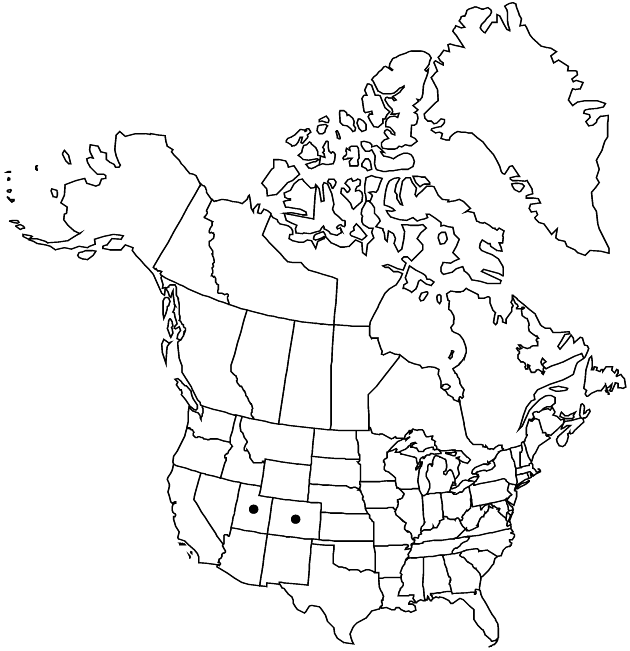Difference between revisions of "Cirsium clavatum var. clavatum"
FNA>Volume Importer |
FNA>Volume Importer |
||
| Line 23: | Line 23: | ||
|elevation=2100–3400 m | |elevation=2100–3400 m | ||
|distribution=Colo. ;Utah. | |distribution=Colo. ;Utah. | ||
| − | |discussion=<p><i>Cirsium clavatum</i> grows from the Colorado Plateau of central Utah eastward into the Rocky Mountains of western Colorado. R. J. Moore and C. Frankton (1965) suggested that <i>C. clavatum</i> (i.e., <i></i>var.<i> clavatum</i> here) is a derivative of hybridization between <i>C. eatonii</i> and C. centaureae (i.e., <i>C. clavatum </i>var.<i> americanum</i> here). S. L. Welsh (1983) noted that the distribution of <i></i>var.<i> clavatum</i> is distinct from those of <i></i>var.<i> americanum</i> and <i>C. eatonii</i>. It is certainly possible that ancient hybridization may have contributed to the origin of <i></i>var.<i> clavatum</i>, but there is no indication that the modern plants over most of its range are hybrids. The morphology of certain plants from southeastern Utah indicates a possibility of hybridization between <i>C. clavatum</i> and <i>C. eatonii </i>var.<i> eatonii</i>. The close relationship between <i></i>var.<i> clavatum</i> and <i></i>var.<i> americanum</i> is evident in the many overlapping vegetative features. The recently described <i>C. clavatum</i> var. markaguntense S. L. Welsh is a minor variant with subentire glabrous leaves.</p> | + | |discussion=<p><i>Cirsium clavatum</i> grows from the Colorado Plateau of central Utah eastward into the Rocky Mountains of western Colorado. R. J. Moore and C. Frankton (1965) suggested that <i>C. clavatum</i> (i.e., <i></i></i>var.<i><i> clavatum</i> here) is a derivative of hybridization between <i>C. eatonii</i> and C. centaureae (i.e., <i>C. clavatum </i>var.<i> americanum</i> here). S. L. Welsh (1983) noted that the distribution of <i></i></i>var.<i><i> clavatum</i> is distinct from those of <i></i></i>var.<i><i> americanum</i> and <i>C. eatonii</i>. It is certainly possible that ancient hybridization may have contributed to the origin of <i></i></i>var.<i><i> clavatum</i>, but there is no indication that the modern plants over most of its range are hybrids. The morphology of certain plants from southeastern Utah indicates a possibility of hybridization between <i>C. clavatum</i> and <i>C. eatonii </i>var.<i> eatonii</i>. The close relationship between <i></i></i>var.<i><i> clavatum</i> and <i></i></i>var.<i><i> americanum</i> is evident in the many overlapping vegetative features. The recently described <i>C. clavatum</i> var. markaguntense S. L. Welsh is a minor variant with subentire glabrous leaves.</p> |
|tables= | |tables= | ||
|references= | |references= | ||
| Line 47: | Line 47: | ||
|publication year= | |publication year= | ||
|special status= | |special status= | ||
| − | |source xml=https://jpend@bitbucket.org/aafc-mbb/fna-data-curation.git/src/ | + | |source xml=https://jpend@bitbucket.org/aafc-mbb/fna-data-curation.git/src/f6b125a955440c0872999024f038d74684f65921/coarse_grained_fna_xml/V19-20-21/V19_91.xml |
|tribe=Asteraceae tribe Cardueae | |tribe=Asteraceae tribe Cardueae | ||
|genus=Cirsium | |genus=Cirsium | ||
Revision as of 19:39, 24 September 2019
Abaxial leaf faces glabrous to ± tomentose. Involucres ovoid to campanulate, 1.5–2 × 1–2 cm, glabrous or thinly arachnoid-tomentose with fine, non-septate trichomes. Phyllaries in 5–6 series, strongly imbricate, green or with dark subapical patch, lanceolate to ovate, abaxial faces with narrow glutinous ridge; outer and middle bases appressed, apical appendages erect or ascending, linear-lanceolate, entire, usually not scarious or fringed, acicular-acuminate, spines erect or ascending, 3–6 mm; apices of inner sometimes flexuous or reflexed, narrow, flat, and entire or minutely toothed to slightly expanded and erose.
Phenology: Flowering summer (Jun–Sep).
Habitat: Sagebrush scrub, aspen groves, meadows, openings in montane coniferous forests
Elevation: 2100–3400 m
Discussion
Cirsium clavatum grows from the Colorado Plateau of central Utah eastward into the Rocky Mountains of western Colorado. R. J. Moore and C. Frankton (1965) suggested that C. clavatum (i.e., var. clavatum here) is a derivative of hybridization between C. eatonii and C. centaureae (i.e., C. clavatum var. americanum here). S. L. Welsh (1983) noted that the distribution of var. clavatum is distinct from those of var. americanum and C. eatonii. It is certainly possible that ancient hybridization may have contributed to the origin of var. clavatum, but there is no indication that the modern plants over most of its range are hybrids. The morphology of certain plants from southeastern Utah indicates a possibility of hybridization between C. clavatum and C. eatonii var. eatonii. The close relationship between var. clavatum and var. americanum is evident in the many overlapping vegetative features. The recently described C. clavatum var. markaguntense S. L. Welsh is a minor variant with subentire glabrous leaves.
Selected References
None.
